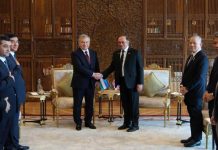
While it is too early to determine whether the tariffs imposed by the tariffs imposed by the United States on Canada, Mexico and China will harm or benefit Malaysia, Minister of Investment, Trade and Industry Tengku Datuk Seri Zafrul Abdul Aziz said that the country could stay cautious that the trade war may nor benefit Malaysia the way it had before.
“For an open country like Malaysia, long term stability in the global trade market is very important. We also do not know what the US will do next to Malaysia and our neighbouring countries,” he said, in response to the US’s move to impose a 25% tariffs on imports from Canada and Mexico and a 10% tariff on imports from China.
Although the trade war between the US and China is seen to be increasingly tense and may affect certain sectors, Tengku Zafrul said that Malaysia might receive positive spillovers in the short term.
“The trade war has led to a shift in the global supply chain, with investors looking for a more stable and alternative location. The realignment is (headed) to countries that are neutral like Malaysia, like ASEAN and some other countries or economic blocs.
“Neutral countries such as Malaysia and ASEAN members have become preferred destinations because we offer a strong ecosystem and a conducive investment climate. Due to this shift, our country has recorded an increase in export value. Malaysia is chosen because of its political stability, open economy and neutral status in the geopolitical arena,” he noted.
Amid the global geopolitical tensions, Malaysia has been active in strengthening investment policies, including through the New Industrial Policy (NIMP), the National Energy Transition Roadmap (NETR) and the National Semiconductor Strategy.
“Investment is not only of high value but should provide economic spillover to local companies, especially small and medium-sized enterprises (SMEs). With the continued trade tensions, global companies tend to choose countries with stable ecosystems, economic openness and strong free trade agreements (FTAs),” he explained.
However, the minister warned that in the long term, the slowdown in global growth could affect demand and supply chains, emphasising the importance of ASEAN in strengthening internal trade and not being too dependent on the world’s big economies.
“ASEAN is the world’s fifth largest economic bloc with a gross domestic product (GDP) of US$3.8 trillion, but intra-ASEAN trade is still less than 25%. We need to increase regional economic integration.
“Malaysia is also trying to diversify its export markets to other regions such as Africa and South America to reduce dependence on major economic powers,” he added.
Regardless, Economy Minister Datuk Seri Rafizi Ramli believes that Malaysia is still on track to meet its 2025 GDP growth target as optimism for the country’s medium- and long-term growth prospects remains unchanged, aside from a stronger ringgit earlier this February.
However, he said that the government is still closely monitoring the risks, with Tengku Zafrul’s ministry (MITI) being responsible for gathering input from all ministries.
Even though the Finance Ministry had projected Malaysia’s GDP to grow between 4.5-5.5% in 2025, Razifi Ramli said the trade war would likely remain a permanent feature of the global economy and that Malaysia would need to navigate around the adjustments and volatility caused by it.
“I think the market will find a way to factor everything and price everything in due time. Eventually, it will come back to the value proposition that the Malaysian economy can propose to the world.
“On that note, I think some of the hypotheses that have resulted in a lot of interest on the Malaysian economy, for the last year or so, have not changed,” he added.
He said the projection that the world will be more digital and artificial intelligence (AI) driven also has not changed, which would benefit Malaysia as a key semiconductor hub.
“That means demand for chips will go up and that will bolster Malaysia’s trade. Our long-term plan is to make sure that Malaysia plays a pivotal role in that global supply chain and that has not changed either. So, a lot of our economic plans have been built around long-term megatrends,” he noted.
























